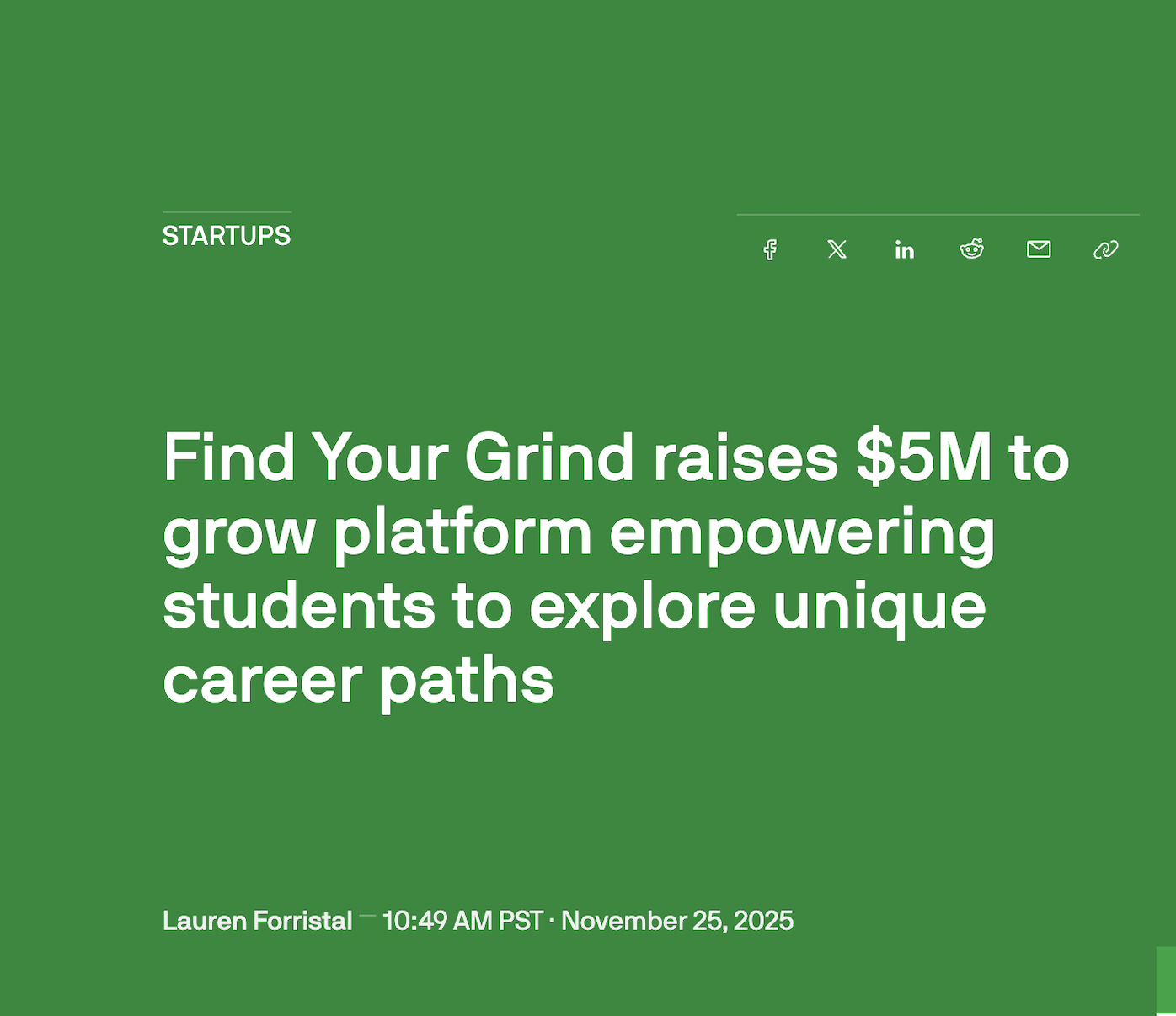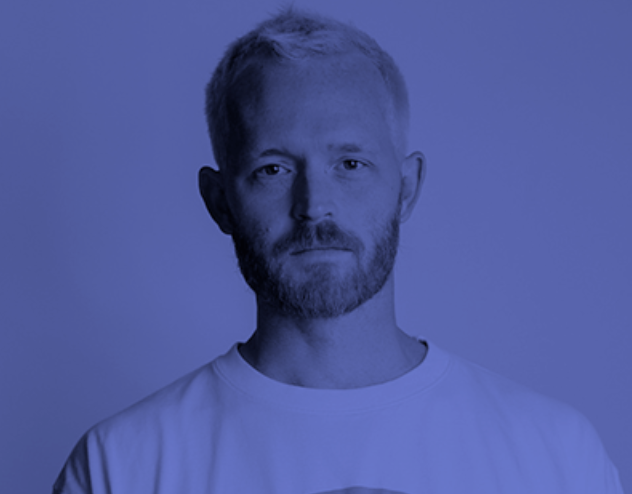November 9, 2021 | Liz McCardle
The Find Your Grind Theory of Change
The most powerful learning solution for future readiness: an evergreen strategy to learning.

Summary
- Research supports the need for educational programming that addresses career exploration and personal development.
- Social Cognitive Career Theory (SCCT) considers the complex relationships among self-efficacy (beliefs about ability), outcome expectations (beliefs about consequences of an action), and goal-setting (decisions about taking an action).
- Sociocultural factors such as gender, race, ethnicity, socioeconomic status, sexuality, and (dis)ability are integral and cannot be separated from this process according to SCCT.
- Progressive learning sets students on a path of building confidence, intuition, and expertise through investment and reinvestment in new or increasingly complex knowledge and skills.
- Over time, a student’s interest, knowledge, skill, confidence, attitude, action, improvement, and interaction regarding a particular goal or mission mutually reinforce one another, encouraging continued reinvestment.
- External factors such as school culture, resources, curriculum, individual characteristics, and elements of the larger context influence this progression in both individuals and groups.
- The concepts described are interwoven throughout FYG’s platform to ensure whole student development and preparation for the future in 5 areas of short-term, medium-term, and long-term outcomes: self-discovery, occupational awareness, self-efficacy, social capital, and aspirations.
- Short-term outcomes focus on growing knowledge and awareness, medium-term invests and reinvests to focus on action and belief, and long-term focuses on adaptability skills, optimism for the future, and overall self-efficacy.
Read on to discover the details of the Find Your Grind Theory of Change, or download the white paper documents below
Part 1: Progressive Learning Cycles
Part 2: Social Cognitive Career Theory and Career Exploration
Part 3: The Find Your Grind Logic Model
White Paper: The Find Your Grind Theory of Change
THE FIND YOUR GRIND LOGIC MODEL
Part 1: Progressive Learning Cycles
Any student who decides to pick up a guitar, crochet hook, or coding manual has engaged in an unwritten contract to try and do something new they’ve never done before, despite challenges they may face. Of course, many amateur guitar players give up before they even master their first chord, and many experienced coders grow weary of their field eventually. The question of what sustains intellectual engagement can be answered, in part, by cycles of progressive learning.
Acquiring a new skill is exciting at first – that initial strum of the guitar, after positioning your fingers on the strings just right. You feel your skills growing, and that initial burst of excitement sustains you to keep practicing as you develop your newfound asset. As you generate results, you reinvest in your own growth and continue to attempt more challenging skills. The guitar player who needed visual cues and extra effort to get the right chord configuration can eventually play without looking or seemingly thinking too much about what their hands are doing. If, on the other hand, you find subsequent tasks too challenging or not challenging enough, you may find yourself less and less motivated to reinvest. At this point, your asset begins to deplete as you stop investing time and effort in practicing the guitar and start forgetting the basics you had learned.
One way to visualize this process of growing and depleting assets is by picturing a spiral. If you are highly motivated, receiving positive feedback, and consistently overcoming challenges, your spiral will grow in an upward motion. If, on the other hand, you are not reinvesting in skills and finding your talents depleting faster than they are growing, you will experience a neutral or even downward spiral and likely give up on the activity. Much like the aforementioned guitar player who began to play freely and automatically over time, those who do choose to continuously reinvest in their own skills will tackle increasingly complex tasks, gradually becoming more intuitive and automatic as they go.
Progressive learning cycles can help us understand how individuals gain expertise in a certain skill or asset, but how does all this connect to the lofty goal of preparing Gen Z for the future of work? By connecting progressive cycles of learning with Social Cognitive Career Theory, a model of career exploration emerges that can move and grow with the rapidly changing world of Gen Z.
Part 2: Social Cognitive Career Theory and Career Exploration
The American School Counseling Association (2003) recommends that schools promote programs to enhance students’ academic, career, social, and personal domains. Students must be given opportunities to increase their awareness of potential careers, identify their career goals, and apply new knowledge and skills to achieving these goals. To this end, all students need to understand the connection between their interests, talents and abilities, and the world of wor, along with how to identify and act on information relevant to furthering their educations and careers (Barker & Satcher, 2000). Career preparation is even more crucial for first-generation college students, who have unique needs as compared to their continuing-generation counterparts. As of 2016, over half of all college students nationwide identified as first-generation; an approach that addresses the needs of this and other diverse populations is central to achieving equity in career and higher education opportunities.
Social Cognitive Career Theory (SCCT) is one approach that may address the personal and career development needs of diverse populations of adolescents while keeping in mind the rapidly changing economic and career landscape ahead of us. First-generation college students in particular may be well-served by programming that incorporates SCCT into its theoretical framework (Lent et al., 1996). SCCT as a framework considers how a student’s academic interests and career choices mature and how these choices are turned into action (Gibbons & Shoffner, 2004). Lent et al. (1994) have identified three main tenets of SCCT that help educators support students through their career exploration journeys: self-efficacy, outcome expectations, and goal-setting.
Self-efficacy refers to the beliefs an individual has about their ability to be successful in a given task, while outcome expectations are the beliefs one has about the consequences of taking a certain action or completing a task (Bandura, 1977). A student with a wealth of positive personal and vicarious experiences and good task understanding is likely to have high self-efficacy and positive outcome expectations, though this is not always the case. A student with high self-efficacy may still experience low outcome expectations if societal messaging communicates achieving a goal is unlikely. For example, a female student who is interested in welding and believes she is personally capable of success may still abandon this potential career path if she has been told repeatedly that welding is a man’s job. If, on the other hand, this same student sees many examples of successful female welders and receives sufficient verbal encouragement to enter the field, she is likely to begin setting and pursuing goals related to this task.
Taken together, the relationship between self-efficacy, outcome expectations, and goal-setting is ongoing, complex, and ever-changing, and sociocultural factors such as gender, race, ethnicity, socioeconomic status, sexuality, and (dis)ability are integral to this process. With each new stimulus, change in environment, or personal experience, an individual is likely to adjust their perception of themselves, and this in turn influences their pursuit of goals. Practice efforts may reinforce or change previous self-efficacy and outcome beliefs as individuals engage in a process of progressive learning and expertise development. Over time, career interests typically stabilize as new goals are set and beliefs continue to form.
Part 3: Progressive Learning, Social Cognitive Career Programming, and the Find Your Grind Logic Model
The Find Your Grind for Schools Logic Model is rooted in several key assumptions about youth, human development, and career preparation. We know the majority of young people feel unprepared for their futures and lack the critical skills they need to transition to the workforce (MMR Research Associates, 2018). The role schools play in preparing students for an uncertain future cannot be understated. Today’s young people need opportunities to develop transferable skills that will aid in both their career growth and personal development. Opportunities to discover and describe their own skills, talents, and values is empowering to such students and central to finding their place in the world. The process of discovering, developing, and reflecting on these assets is ongoing, complex, and rooted in developmental and reflective progressive learning strategies that emphasize long-term rather than immediate results. External factors such as school culture, resources, curriculum, individual characteristics, and elements of the larger context also influence this progression in both individuals and groups. Social Cognitive Career Theory provides a basis for promoting this type of self-exploration and career readiness by focusing on gains in self-efficacy, outcome expectations, and actionable goals. Five key areas are emphasized in this model to ensure whole student development and preparation for the future: Self-discovery, occupational awareness, self-efficacy, social capital, and aspirations.
In the short term, classes utilizing the Find Your Grind for Schools platform focus on growing their knowledge and awareness of who they are and what their possibilities for the future might be. Students are encouraged to develop a mindset for success, learn about their own strengths, be inspired by mentors, and imagine their ideal futures. As they invest and reinvest in their own strengths and talents, students further develop their self-belief and begin taking action in pursuit of their goals. They may begin testing out the fit of their desired career by engaging in volunteer work, internships, or independent practice that aligns with the steps in their action plans. During this time, students continue to be inspired by their own progress and the vicarious experiences of mentors. In the long term, students develop greater self-efficacy, optimism for their futures, and adaptable skills that can serve them in a variety of future pathways. Throughout the myriad changes of adolescence and emergent adulthood, students learn to maintain an open mind and core sense of self as they prove through their own expert performance outcomes that they are ready for the future they have imagined.
Conclusion
Throughout history, schools have been tasked with preparing their students for the future. With career outlooks becoming less predictable than ever, schools must implement programming that proactively addresses career exploration and personal development while emphasizing adaptability and transferable skills. Social Cognitive Career Theory (SCCT) considers the complex relationships among self-efficacy (beliefs about ability), outcome expectations (beliefs about consequences of an action), and goal-setting (decision about taking an action), and considers external school and sociocultural factors such as gender, race, ethnicity, socioeconomic status, sexuality, and (dis)ability to be integral to this process. SCCT serves as the foundation for the Find Your Grind for Schools platform, which sets students on a path of self-determined progressive learning to build confidence, intuition, and expertise through investment and reinvestment in new or increasingly complex knowledge and skills. Over time, a student’s interest, knowledge, skill, confidence, attitude, action, improvement, and interaction regarding a particular goal or mission mutually reinforce one another, encouraging continued reinvestment. By investing in students’ personal career paths, providing opportunities for exploration, and developing their social and aspirational capital, schools can be more proactive and forward-thinking in preparing their students for the future of work.
References
- American School Counseling Association. (2003). The ASCA national model: A framework for school counseling programs, executive summary. http://www.schoolcounselor.org/ library/ ExecSumm.pdf
- Bandura, A. (1977). Self-efficacy: Toward a unifying theory of behavioral change. Psychological Review, 84(2), 191–215. https://doi.org/10.1037/0033-29 5X.84.2.191
- Bangert, D., Schubert, E., & Fabian, D. (2014). A spiral model of musical decision-making.
- Frontiers in Psychology, 5. https://doi.org/10.3389/fpsyg.2014.00320
- Barker, J. & Satcher, J. (2000). School counselors’ perceptions of required workplace skills and career development competencies. Professional School Counseling, 4, 134-139.
- Doty, E. (2018, February 6). The upward spiral: Bootstrapping systemic change. The Systems Thinker. https://thesystemsthinker.com/the-upward-spiral-bootstrapping-systemic-change/.
- Gibbons, Melinda & Shoffner, Marie. (2004). Prospective first-generation college students: Meeting their needs through Social Cognitive Career Theory. Professional School Counseling, 8, 91-97
- Lent, R.W., Brown, S.D., & Hackett, G. (1994). Toward a unifying social cognitive theory of career and academic interest, choice, and performance. Journal of Vocational Behavior, 47, 79-122.
- Lent, R.W., Brown, S.D., & Hackett, G. (1996). Career development from a social cognitive perspective. In D. Brown, L. Brooks, & Associates (Eds.), Career choice and development (3rd ed., pp. 373-42 1 ). San Francisco: Jossey.
- MMR Research Associates. (2018, June 28). New survey: Only 4 in 10 U.S. college students feel well-prepared for their future careers; perceptions of preparedness vary widely by gender. McGraw Hill. https://www.mheducation.com/news-media/press-releases/2018-future-workforce-survey-results.html
- US Department of Education (n.d.). Progress in our schools. https://www.ed.gov/k-12reforms


